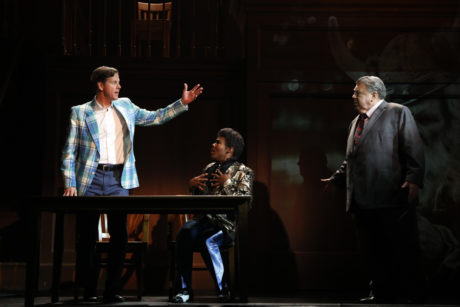
Rock and Roll Man: The Alan Freed Story, a new musical at Bucks County Playhouse, New Hope, PA, September 2017.
Cleveland was picked to be the home of the Rock and Roll Hall of Fame because a Cleveland disc-jockey, Alan Freed, was one of the first men to promote that type of music and he coined the phrase “rock and roll.” Yet his name became almost forgotten by a new generation.
Philadelphia lobbied hard to house the Hall of Fame, based on being the adopted home of Bill Haley and the birthplace of American Bandstand, originally known as Bandstand when it went on TV in 1952. Other cities which lost the competition were Memphis (home of Sun Studios and Stax Records) and Detroit (home of Motown Records.)
Because Philadelphia had its own story, local folks tended to be dismissive of Freed. They didn’t care that he went on the air before Bandstand, playing records predominantly by black musicians. But music lovers from the Philly area should make a special effort to see Rock and Roll Man: The Alan Freed Story, which is in its world premiere at the Bucks County Playhouse in New Hope, Pennsylvania.
They will learn a lot from this dramatic re-enactment of Freed’s career, and be entertained by excellent imitations of many of the performers whom he popularized. Rock and Roll Man is far superior to Motown the Musical which played on Broadway last year. Freed’s life was more interesting than Berry Gordy’s, and the rock imitations are better too.
Freed pioneered in promoting records by black artists and this show reveals the hostility of many racists to this innovation. These people went gunning for Freed, and he gave them ammunition when he made deals with mob-related racketeers, when he acted abrasively, and when he became a womanizer and an alcoholic. Alan Campbell, a longtime leading man on Broadway, is appealing as Freed and my sole criticism is that it would be more interesting to see more of the man’s dark side.
Writers Gary Kupper, Larry Marshak and Rose Caiola accomplish three tasks. They showcase the music, reveal Freed as a complex man, and describe the sordid and corrupt aspect of the music business. Their script packs a lot of information, and presents it accurately. I can attest to that, because when I was in school I worked two summers as music librarian at two of Philadelphia’s top radio stations, and I saw how men from record companies gave gifts to disc jockeys in order to get airplays for their songs. I also worked at channel 6 and saw the firing of Bob Horn, the first host of Bandstand, and the investigation of Dick Clark, who succeeded him, for profiting from the music that he put on the air.
Two featured roles are superbly acted by one man, Bob Ari. In Act I he’s Leo Mintz, a record store owner who helps Freed’s career, and in Act II he’s the nasty Morris Levy who has connections in organized crime. George Wendt (from TV’s Cheers) plays FBI Chief J. Edgar Hoover, who hated Freed’s music and assiduously pursued him.
Richard Crandle is the flamboyant Little Richard who impresses not only with his singing but also in his dramatic contributions. Matthew Sean Morgan plays and sings Chuck Berry and Screamin’ Jay Hawkins; John Dewey is amazingly versatile as he portrays Buddy Holly, Pat Boone and other cameos. Soara-Joye Ross belts strongly as LaVern Baker. Dave Keyes leads a five-piece band.
Gary Kupper wrote several new songs that help the plot move along. Freed’s mother and wives are played by Heather Parcells, Melissa van der Schyff, and Whitney Bashor, who has an especially lovely voice. Director Tim Mackabee’s set gives prominence to a courtroom which encapsulates Freed’s many legal travails into a metaphorical examination of his character. Director Randal Myler maintains a fast pace and Brian Reeder contributes fine choreography.
As Rock and Roll Man develops, I suggest some trimming of Freed’s rather ordinary family background, putting more focus on the dirty dealings in the music and broadcasting industries and on the music performances. Those impressions of singers are wonderfully entertaining.
Below, Campbell as Freed:
